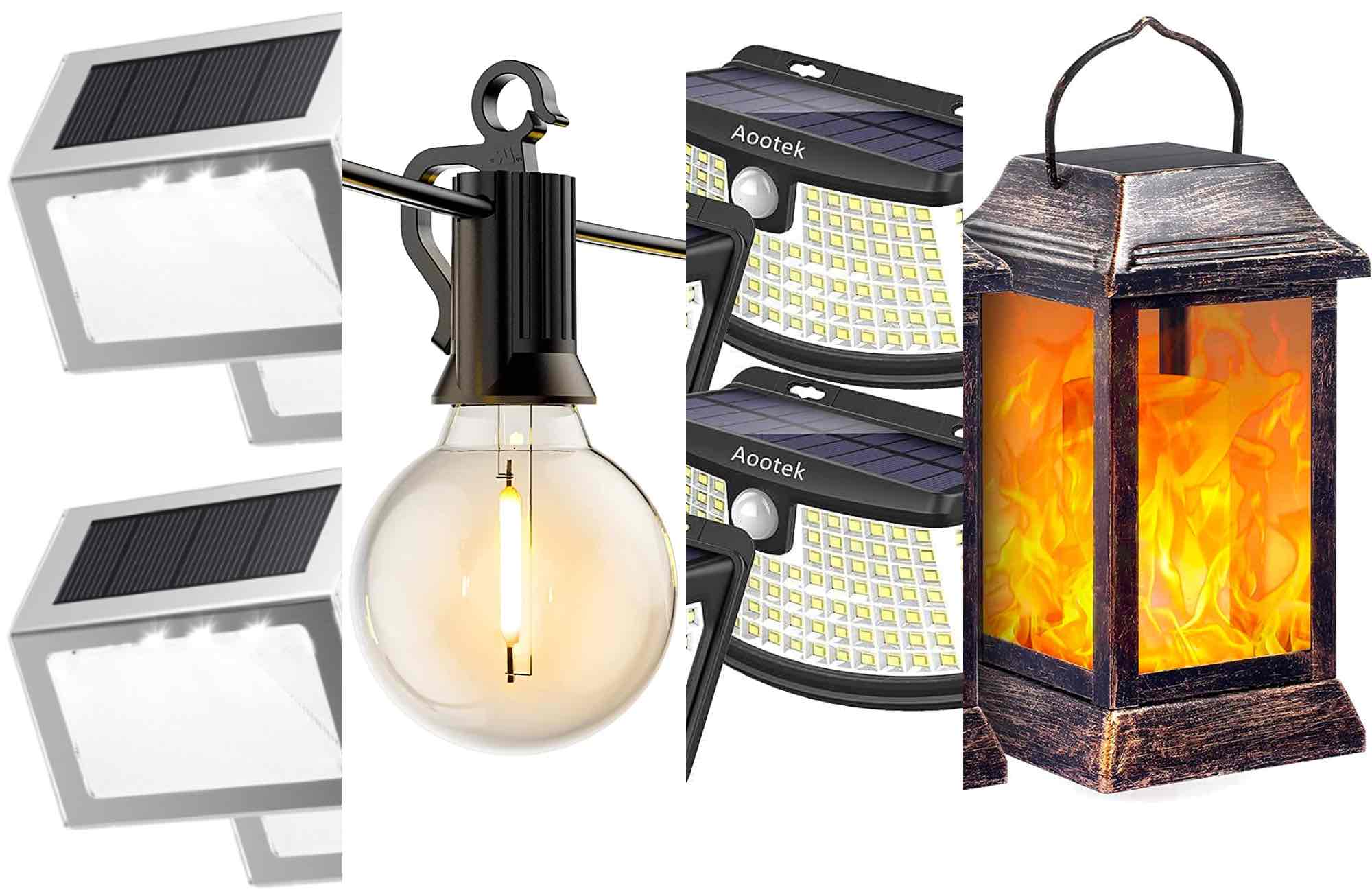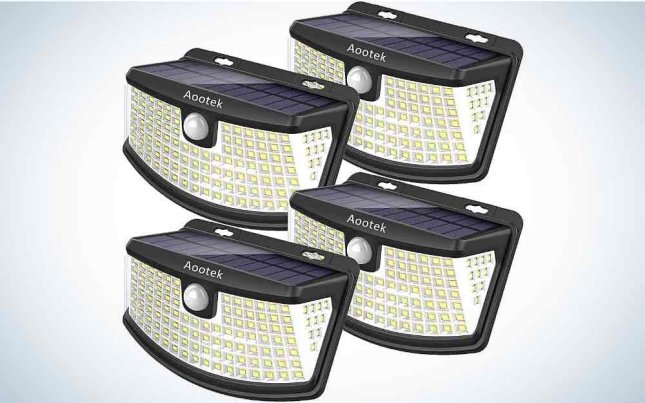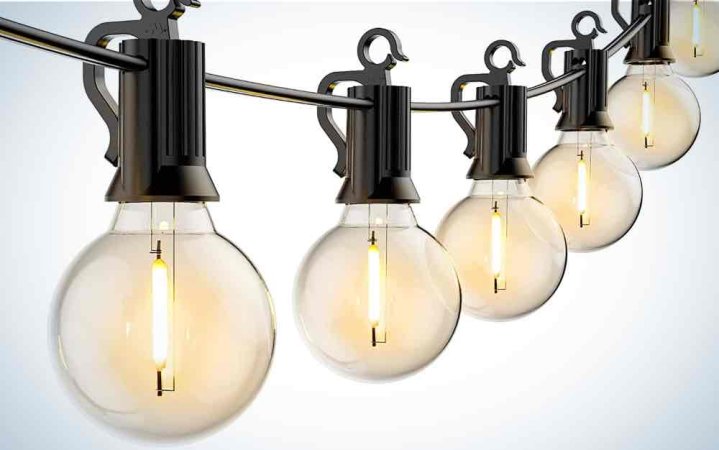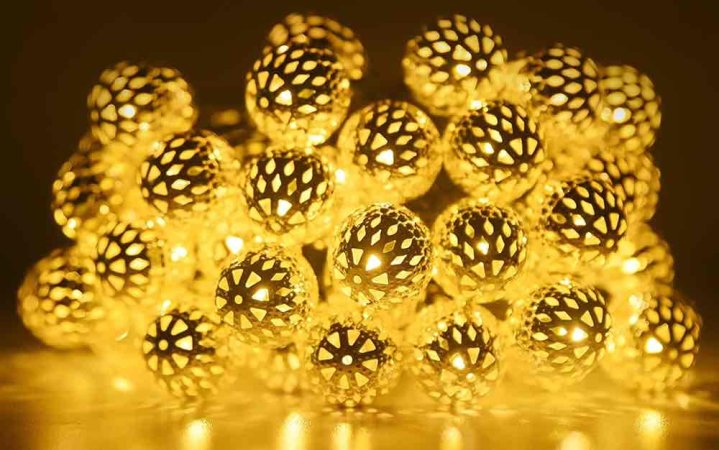We may earn revenue from the products available on this page and participate in affiliate programs. Learn more ›

A solid set of solar deck lights can change the tone of an entire outdoor space without much cost or effort. There are many different styles to choose from, each with their own specialties. Some provide a romantic ambiance, while others function to illuminate stairs and other objects to help you and your guests avoid accidents. Here, we’ve collected a comprehensive list of the best solar deck lights for any style, functionality, or circumstance.
- Best overall: Aootek Solar Lights with Lights Reflector
- Best stair lights: JACKYLED Solar Step Lights
- Best string lights: Brightown Solar String Lights
- Best deck post lights: VOLISUN Solar Post Cap Lights
- Best lanterns: TomCare Metal Solar Lantern Light
- Best budget: Lightique Moroccan String Lights
How we chose the best solar deck lights
Finding the best solar deck lighting goes beyond finding the best forms for them (strings, stair illuminators, etc.) but also needs to consider several more complex factors. To make our decisions, real-world functionality, and materials were highly considered.
Solar-powered deck lights are tricky to fully review for anyone due to the somewhat finicky nature of the weather. As humans, we tend to over or underestimate local cloudiness based on our temperaments. Accordingly, it makes sense to cast a wide range and survey large numbers of real customer reviews, often more telling than expert reviews of lights in near-pristine conditions. How is the actual brightness and reliability of the lights, for instance?
Despite the low energy costs of maintaining outdoor lighting, many people buy solar-powered deck lights for their environmental benefits. Unfortunately, there are some environmentally destructive solar-powering materials. Manufacturers aren’t always forthcoming with what materials they use, and deck lights are, admittedly, small. Still, we’ll do our best to present what materials are used so you can make an informed decision about your purchase.
The best solar deck lights: Reviews & Recommendations
Choosing a single best solar deck lights set is difficult due to the many types available and the niches they each fill. Still, the Aootek Solar Lights with Lights Reflector easily takes our slot for top dog in the hierarchy. They fill their niche so well they can take on multiple jobs! But, if you need something else—including a bit of ambiance—we have a full list of great picks where you’re sure to find something that suits your needs, including deck lights that can be hung overhead, used specifically for stairs, and more.
Best overall: Aootek Solar Lights with Lights Reflector
Aootek Solar Lights with Lights Reflector
Why it made the cut: With a smart design and smart function, these are powerful lights!
Specs
- Brightness: ~2,000 Lux
- Weather-resistance: IP65
- Materials: Plastic, monocrystalline silicon
- Control: Automatic, remote
- Price: $58
Pros
- Surprisingly bright
- Three lighting modes to suit your preferences
- Mirror light reflector tech
- Environmentally friendly silicon solar panel
Cons
- Not the best for “ambiance”
If you’re looking for something tough, bright, and reactive, then the Aootek Solar Lights are the best place to start. In a product category that typically shies away from being too “smart” (the typical smart tech sucks energy out of a system quickly), Aootek makes some great compromises to make deck lights that will do what you want when you want them to, in a convenient way.
They do this by providing three modes of usage. First, there is an energy-conserving security light mode triggered by motion, which is best used to ward others away from your deck when it isn’t in use. Next, a permanent on mode keeps the light on consistently throughout, perfect for your nighttime party. Finally, a sort of hybrid smart brightness mode brings the best of both worlds, giving a low level of light that gets brighter when motion is detected. This final lighting mode is perfect for guiding guests from your garden, or other parts of your landscape, to your deck and keeping them safe once there. In all instances, the lights are a clear and bright white, which is perfect for vision but may not necessarily create as romantic of an environment as other choices on this list. After installing the lights, they should stay well-protected as they have a durable plastic frame and achieve IP65 protection, meaning they are resistant to both dust and rain. And, speaking of materials, the solar power collection system is silicone based. Silicone panels are typically carbon-free, making these the best motion-sensing lights and somewhat better for the environment.
Best stair lights: JACKYLED Solar Step Lights
JACKYLED Solar Step Lights
Why it made the cut: Strong and bright, the JACKYLED step lights won’t break or let you fall.
Specs
- Brightness: 12 Lumens
- Weather-resistance: IP65
- Materials: Stainless steel, monocrystalline silicon
- Control: Automatic, switch
- Price: $39
Pros
- Easier-than-most installation
- Durable, rust-resistant frame
- Bottom and side lights
Cons
- Occasionally one will have a weak battery
The JACKYLED Solar Step Lights provide durability and flexibility for lighting up your steps. With a 3-way lighting system, the JACKYLED can be affixed to the vertical side of your steps to light up the step below and the easily-tripped-on front of the step. Don’t worry about kicking them, either, as the frame is a tough, rust-resistant stainless steel. Alternatively, line them up on the wall or rails adjacent to your steps to get a different angle (if your local lighting permits). No matter where you choose to place them, the setup should be a snap with screw-in and tape-on options available.
Best string lights: Brightown Solar String Lights
Brightown Solar String Lights
Why it made the cut: The Brightown lights offer a romantic ambiance on speed dial.
Specs
- Brightness: Variable settings
- Water-resistance: IP45
- Materials: Plastic
- Control: Timer, remote
- Price: $40
Pros
- Shatterproof bulbs even a klutz can install safely (strong dual hooks)
- Great solar panel
- Neat remote control
- 20,000-hour lifespan
Cons
- Not connectable
If you’re looking for true flexibility, the Brightown Solar String lights will give it to you. First, the setup is easy due to a patented dual-clip design, with clips and hooks adorning both the top and side of each bulb (optional ties can also be used). Even if you were to knock the bulbs about, they’re shatter-resistance. Once up, you can choose from various modes, including timers, variable brightnesses, and effects like blinking or pulsing. On a dimmer mode, they’re the perfect mood lighting and, when made brighter, can keep things light enough to see properly. On blinking mode, they light up the party like twinkle lights. Finally, everything is tied together by an above-average solar panel that can quickly charge indoors if you get an unlucky glut of cloudy days.
Best deck post lights: VOLISUN Solar Post Cap Lights
VOLISUN Solar Post Cap Lights
Why it made the cut: Has a stylish design, fits multiple post sizes, and can store enough energy to last through an overcast day here and there.
Specs
- Brightness: Dual setting
- Weather-resistance: IP44
- Materials: Plastic, Acrylonitrile Butadiene Styrene
- Control: Automatic, switch
- Price: $49
Pros
- Battery holds enough charge to shine for 20 hours on lower brightness setting
- Fits both 4×4 and 6×6 post tops
- Pop-on installation is easy
Cons
- Doesn’t fit 5×5 post tops
VOLISUN is a pretty prolific maker of solar deck lights in every style. Their solar post cap lights stand out amongst their collection for their ease of use, style, and lasting power. Choose between a 4×4 or 6×6 setting (based on the size of your post), pop it on, and tighten a couple of screws, and your system is completely installed. But, before you move, flip the switch to ‘I’ or ‘II’ to select a power mode. The lower mood setting—‘I’ power—can last over 20 hours on a single charge, while the stronger ‘II’ setting can last over 10 hours. In other words, if you’re satisfied with the lower setting, you’ll be able to have guaranteed lights (next to) all the time, even after a day of inclement weather.
Best lanterns: TomCare Metal Solar Lantern Light
TomCare Metal Solar Lantern Light
Why it made the cut: Hang, carry, or put on your table—the TomCare lanterns are super versatile in presentation
Specs
- Brightness: 25 Lumens
- Weather-resistance: IP65
- Materials: Metal, Acrylonitrile Butadiene Styrene (ABS)
- Control: Automatic, Switch
- Price: $43
Pros
- Easily maneuverable
- Sturdy metal frame
- Attractive flickering effect
Cons
- Not as cheap as the average solar deck lights
A lot of solar lanterns fail at one of the most basic things they should do: looking and feeling like a lantern. The tops of both lanterns in the TomCare Metal Solar Lantern Light kit have a relatively innocuous solar panel, but the rest look like something out of history. The grainy, faux-aged copper, aside from the flickering flame-effect lighting inside, looks particularly decorative. Even better, this lantern offers much more versatility than other lanterns meant to sit or hang only. Place your lantern on a table as a set piece or hang it just about wherever you’d like, but try to find a regular resting spot that gets some sun during the day!
Best budget: Lightique Moroccan String Lights
Lightique Moroccan String Lights
Why it made the cut: They’re the easiest way to get a bit of solar power on your deck.
Specs
- Brightness: Variable modes
- Weather-resistance: IP65
- Materials: Copper
- Control: Touch
- Price: $13
Pros
- Incredible IP rating for the price
- Simple installation
- 8 lighting modes
Cons
- Short string (good if that’s all you need)
If you don’t need anything too elaborate and just want a short string of lights, try Lightique’s Moroccan String Lights. On the one hand, it’s just 10 feet of string lights. On the other hand, they provide eight lighting modes (including favorites like twinkle flash and wave), a unique look, a super simple installation, and the perfect size to install above your door. Additionally, at under $10, an IP68 rating is practically unheard of. If you have a wider door, it might be nice to have a longer string of lights, but for this price, you can’t really get any better.
What to consider before buying solar deck lights
When choosing solar deck lights for your property, you’ll naturally want to gravitate toward an aesthetic you like. Simply looking at product images can help you with this. However, things can get a bit more tricky once you’ve narrowed your selection down by taste. You’ll want to ask yourself what materials are used in producing the device and its bulbs’ caging. There are also factors, such as placement and weather resistance, that are surprisingly similar to the questions you’d be asking yourself if you were buying a potted plant for your deck.
Placement
Where should you place your solar deck lights? It’s more than feng shui, but you’ll definitely need to consider the facing of your solar panels, with a Northern exposure being especially bad if you live in the Northern Hemisphere. In fact, a lot of the placing suggestions are at least somewhat similar to what would be suggested for plants that require medium to high sunlight; avoid placing solar panels under overhangs, brush, and other locations where the light cannot reach them.
The next thing to think about is how to arrange your lighting. Are your solar deck lights multidirectional, unidirectional, or a standard bulb in open space? 3-way designs are especially useful for lighting up stairs and are best placed on the vertical part of each step. In this position, they emphasize both the landing for the foot and the height needed to take on each subsequent step. Avoid positioning bright bulbs or intense unidirectional lighting too close to head height—for adults and children—as it could be uncomfortable to the eyes.
Finally, what are the odds that something will get smacked, stepped on, or hit when the furniture is moved? If your solar deck lights aren’t made of a strong material (see below) then you might be faced with being extra careful or removing them temporarily when bringing in new deck gear.
Weather resistance
Whether or not a product can withstand a slight drizzle is usually the first thing buyers look at in an outdoor product. Unfortunately, it is a bit more complex than picking something labeled as “waterproof” due to the nature of the outdoors.
Your first thing to check should be a product’s IPXX rating, which will display as a number like IP46 or IPX8. More officially known as an item’s Ingress Protection rating, the numbers refer to a standardized 3rd party measure of a product’s officially tested protection against solids and liquids. Nowadays, the system is used for everything from earbuds to solar deck lights. While not all good weather-resistant products have an IP rating, you can feel secure in those that do.
The first digit after the P measures an object’s ability to withstand dust. For solar deck lights, this number will usually be a 4 or a 6, with 4 meaning the product withstands particles greater than a millimeter thick and 6 meaning the product does not allow dust inside. Periodically, you’ll see an ‘X’ instead of a number, which indicates that this test was not performed.
The second digit after the P measures an object’s ability to withstand water and other liquids to a lesser degree. For a solar deck light, a rating of 4 or 5 will likely do in most situations, as these signify the device is protected from spraying and splashing water from multiple directions. A rating of 7 or higher indicates the solar deck light could withstand being fully submerged in water for a period of time. Just how well are solar deck lights protected from the rain? As a fun fact, please note that there are customer reports of solar deck lights surviving Floridian hurricanes.
Finally, there are a couple of miscellaneous categories to check for. If your frame is steel, is it stainless steel or marked to be rustproof? While these issues might largely be aesthetic, having rust accumulate around screw holes won’t do you any favors down the line. For hanging and free-swinging solar deck lights, consider finding a product that offers shatterproof bulbs, as they’re both wind-resistant and accident resistant. If you live in an area with extreme temperatures, be sure also to check the upper and lower bounds for temperature that your solar deck lights can withstand.
Materials used
It’s not as in-depth of a category as the other two, but the materials used to make a solar deck light can make or break your experience with it (sometimes literally if it gets kicked but has low-quality caging).
Typically, the main materials you’ll see for the caging of solar deck lights are going to be hard plastic and some form of metal. Plastic can be a stylish black that fades into the night, a more modern iPhone-esque white, or any other color. High-quality plastic is actually quite nice and shouldn’t be ignored. Alternatively, metal casing provides extra security, especially if the light is to be put in a place where it might get stepped on. As mentioned in the previous section, looking for stainless steel or rustproof metal is advised.
Of course, this is for external caging and the parts that make up the solar panel. While we’d all like to pat ourselves on the back, the truth is that deck lights don’t use up a lot of energy in the first place. So long as you’re using modern LED bulbs, your entire home’s lighting shouldn’t even be in your home’s Top 10 energy users.
As a result, it is important to appreciate solar deck lights for their convenience and lack of wires. If you want to be environmentally conscious, focus on the materials used in the solar panel and opt for silicon (especially of the monocrystalline style) when possible. Also, look for new solar panel technologies as they come. Ultimately, though, there is a balance in all things, and solar deck lights are quite tiny in the scheme of things.
FAQs
Solar deck lights are typically not that expensive. You can get a good set for under $60 in most cases. This is because they are primarily made of bulbs and a plastic casing, neither expensive. And, just like with a solar-powered outdoor light, the technology to charge via solar power (at least for smaller objects) is always getting cheaper. In other words, the best solar deck lights are available for everyone.
Not only is it OK to leave solar deck lights on all night, but it is also somewhat encouraged. The best solar deck lights come with timers and other mechanisms to keep your lights on when possible and in such a way that is energy efficient. Unlike the best tiki torches, many of the best solar deck lights are made to run even when you aren’t around and even have motion-sensing modes.
Yes, solar lights charge even on cloudy days, but they charge best on clear days. Just as the fair-skinned can get a sunburn on a cloudy day, your solar panel can pick up at least some UV rays when the sun isn’t at full strength. Many of the best solar deck lights have optional secondary charging mechanisms or multi-use-day battery storage to compensate for the odd overcast day.
Final thoughts on the best solar deck lights
- Best overall: Aootek Solar Lights with Lights Reflector
- Best stair lights: JACKYLED Solar Step Lights
- Best string lights: Brightown Solar String Lights
- Best deck post lights: VOLISUN Solar Post Cap Lights
- Best lanterns: TomCare Metal Solar Lantern Light
- Best budget: Lightique Moroccan String Lights
Solar deck lights illuminate your deck or patio using an inherent wireless design. They are, by nature, a seamless and cost-effective method to enhance both the safety and ambiance of your outdoor spaces. As of 2023, however, finding the best solar deck lights requires some research. It might take some time but rest assured, there is a perfect product out there. Anyone can discover solar deck lights that align with their needs, their family’s preferences, and the specific aesthetic of their home.









